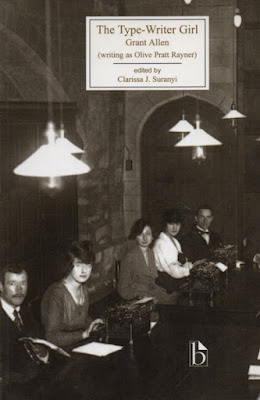The Type-Writer Girl
Grant Allen (writing as Olive Pratt Raynor)
Peterborough, ON: Broadview, 2003
Juliet Appleton is a Girton girl; she knows the meaning of "mandragora" and can spell it with confidence. Though Juliet suffered tragedy in her mother's early death, hers was an otherwise happy childhood. Papa was both loving and kind, but now he too is gone. At twenty-two, Juliet finds herself not only alone but facing a life of poverty. The reasons don't matter – Allen barely mentions them – the important thing is that poor Juliet Appleton has hardly a two-bob bit to her name.
What's a Girton girl to do?
This one answers an advert placed by the legal office of Flor & Fingelman, where she secures a position as "Shorthand and Type-writer (female)". That she could supply her own machine – a Bar-lock
– may have played to her advantage, but they would have hired her just the same. Truth is, Juliet is a significant asset to any firm; she's intelligent, creative, and has a wonderful personality. This is not to say that her character is without flaws; criticism may be made that Juliet is prone to throw caution to the wind. "I was born to take no heed for the morrow," she tells us. "I belong to the tribe of the grasshopper, not that of the ant."
Juliet resigns her post within the week, producing one of the greatest letters of resignation ever written:
You see, Juliet had been unhappy in the unseemly offices of Flor & Fingelman. During lunch break on her third day, she happened to sit within earshot of a Cambridge man who was telling his companion of a colony of agrarian anarchists just outside Horsham. Juliet pawns her typewriter and sets off by bicycle to join their number. The colony is not the quite the utopia of her dreams, nor is it the disaster I was expecting. The anarchists know not what they do and toil inefficiently, yet manage to harvest enough to get by. No, the real problem with the Horsham anarchists is found in their leader Rothenburg, who pressures Juliet to "fraternise".
Our heroine is not long with these people – no longer than she was with Flor & Fingelman – but then The Type-Writer Girl is not a long book. At sixty-six of 119 pages, the third and final act takes up the most
space. However, it is in these same pages that the novella falters and eventually falls flat. Juliet returns to London, where she finds employment in a publishing house run by a romantic figure not much older than herself. She refers to him as "Romeo". Juliet falls in love with her new employer (as she knew she would), while Allen falls back on coincidence (as he invariably does).
The Type-Writer Girl is one of two Allens available from Peterborough's Broadview Press. My pleasure in this is tempered somewhat by the absence of supplementary material of the sort included with other novels Broadview has reissued.
I must add that it is odd Broadview chose to reissue the novella. By far one of Allen's lesser works, its true value lies only as a further sign of
evolution in the author's thought ("evolution" being a word Allen would have appreciated). The Type-Writer Girl may be weak, but its heroine, Juliet Appleton, is strong. As with the title character of his final work, Hilda Wade: A Woman with Tenacity of Purpose, our Juliet is more intelligent, industrious and capable than any who surround her. Both are a far cry from the fragile Blackbird of Under Sealed Orders, whose high education strains to the point at which she takes her own life.
Ultimately, The Type-Writer Girl is as slight as its page count. I find myself agreeing with Allen scholar Peter Morton in judging that The Type-Writer Girl could have been so much more. In his study The Busiest Man in
England, Prof Morton writes of Allen:
If he (and his readers) had been willing to confront the darker side of sexual harassment, it could have been an effective piece of social realism like Wells' Ann Veronica of a few years later. As it is, it ends as little more than a romantic romp.
Damn, now I've got to track down a copy of Ann Veronica.
Favourite line:
"I am anarchic by nature. Wherever there is a government, I am always against it. Let me join your band – and I promise disobedience."A critic raves:
 |
| Athenaeum, 11 September 1897 |
Access: The Type-Writer Girl was first published in 1897 by C. Arthur Pearson. The first American edition appeared three years later, courtesy of cheapo publisher Munro (above). Street & Smith put out an even cheaper edition later that same year. The Pearson edition can be read online here courtesy of the University of Alberta and the Internet Archive.
The Broadview edition is held by sixteen of our universities, Library and Archives Canada, and Bibliothèque et Archives nationales du Québec. I don't see any other anywhere. Surprisingly, no copies of any edition is to be found in the Kingston-Frontenac Public Library.
Related posts:












